Occupy Wall Street (We're Gonna Stay Right Here)

Because this is where they buy the politicians
(continuer)
(continuer)
15/10/2011 - 22:34
Ah ça ira!

Per Bartleby (così battezzato in questi commenti da GPT):
conoscevi http://www.bartleby.info/ ?
conoscevi http://www.bartleby.info/ ?
Lorenzo 15/10/2011 - 21:33
A Pier Paolo (quello che abbiamo scavato)
tratta da "Mare tu nasci per proseguire in stella". Testo contro razzismo, violenza, prevaricazione, indifferenza, stupidità, guerra.
Nelle frasi di chi al mattino grida “Troppi stranieri”,
(continuer)
(continuer)
envoyé par Michele Metta 15/10/2011 - 21:22
Armenian Persecution
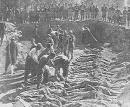
Here is a list of musical works dedicated to the Armenian Genocide and related events:
Alexander Spendiaryan, "Take, O Armenia", opus 27, concert aria (1915, words by H. Hovhannisian)
Komitas, "Children's Prayer" (1915),
Romanos Melikian, "Zmrukhti", song cycle, (1916-1918),
Alexander Arutiunian, "Poem about the Armenian People", (1961, words by Gevork Emin),
H. Stepanian, "The Great Crime", oratoria (1964, words by Paruyr Sevak),
G. Hakhinyan, "II symphony" (1975, words by Paruyr Sevak),
Harutiun Dellalian, "The Death", symphonic poem (1978),
"A Memorial to the Martyrs", requiem cantata, by Harutiun Dellalian, Georges Garvarentz and Gostan Zarian (1984),
Yervand Yerkanyan, "The Voice of Victims", symphony (1984),
Loris Tjeknavorian, "Requiem on Memoriam of Perished People", symphonic work (1974),
E. Hayrapetyan, "Oratoria - 1915" (1977),
Aram Khachaturian, "Vorskan akhper", arrangement... (continuer)
Alexander Spendiaryan, "Take, O Armenia", opus 27, concert aria (1915, words by H. Hovhannisian)
Komitas, "Children's Prayer" (1915),
Romanos Melikian, "Zmrukhti", song cycle, (1916-1918),
Alexander Arutiunian, "Poem about the Armenian People", (1961, words by Gevork Emin),
H. Stepanian, "The Great Crime", oratoria (1964, words by Paruyr Sevak),
G. Hakhinyan, "II symphony" (1975, words by Paruyr Sevak),
Harutiun Dellalian, "The Death", symphonic poem (1978),
"A Memorial to the Martyrs", requiem cantata, by Harutiun Dellalian, Georges Garvarentz and Gostan Zarian (1984),
Yervand Yerkanyan, "The Voice of Victims", symphony (1984),
Loris Tjeknavorian, "Requiem on Memoriam of Perished People", symphonic work (1974),
E. Hayrapetyan, "Oratoria - 1915" (1977),
Aram Khachaturian, "Vorskan akhper", arrangement... (continuer)
DonQuijote82 15/10/2011 - 18:05
Artémis
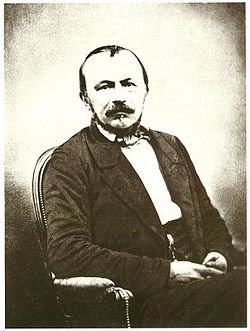
Poesia di Gérard de Nerval
da Les chimères, 1854
Musica di Diamanda Galás
A poem by Gérard de Nerval
from Les chimères, 1854
Music by Diamanda Galás
Album: Defixiones Will and Testament
SONGS OF EXILE is concerned with the poet/musician/composer living in exile, away from his homeland and speaks of those who have had to live as outlaws, as they were treated as outlaws; and for those who have had to create houses out of rock.
The performance, with songs performed over five languages, is a concert for piano and voice which includes Ms. Galás' own transcendent compositions set on the words of exiled poets from around the world.
SONGS OF EXILE (“Canzoni di Esilio”) tratta del poeta, del musicista e del compositore che vive in esilio, lontano dalla sua terra, e parla di coloro che hanno dovuto vivere fuori dalla legge, come se fossero banditi, e creare case dai sassi.
La composizione,... (continuer)
da Les chimères, 1854
Musica di Diamanda Galás
A poem by Gérard de Nerval
from Les chimères, 1854
Music by Diamanda Galás
Album: Defixiones Will and Testament
SONGS OF EXILE is concerned with the poet/musician/composer living in exile, away from his homeland and speaks of those who have had to live as outlaws, as they were treated as outlaws; and for those who have had to create houses out of rock.
The performance, with songs performed over five languages, is a concert for piano and voice which includes Ms. Galás' own transcendent compositions set on the words of exiled poets from around the world.
SONGS OF EXILE (“Canzoni di Esilio”) tratta del poeta, del musicista e del compositore che vive in esilio, lontano dalla sua terra, e parla di coloro che hanno dovuto vivere fuori dalla legge, come se fossero banditi, e creare case dai sassi.
La composizione,... (continuer)
La Treizième revient... C'est encor la première;
(continuer)
(continuer)
envoyé par DonQuijote82 15/10/2011 - 17:31
Birds Of Death
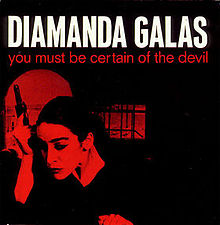
[1988]
Testo e musica di Diamanda Galás
Lyrics and music by Diamanda Galás
Album: Defixiones Will and Testament
Album originale / Original Album: You Must Be Certain Of The Devil
SONGS OF EXILE is concerned with the poet/musician/composer living in exile, away from his homeland and speaks of those who have had to live as outlaws, as they were treated as outlaws; and for those who have had to create houses out of rock.
The performance, with songs performed over five languages, is a concert for piano and voice which includes Ms. Galás' own transcendent compositions set on the words of exiled poets from around the world.
SONGS OF EXILE (“Canzoni di Esilio”) tratta del poeta, del musicista e del compositore che vive in esilio, lontano dalla sua terra, e parla di coloro che hanno dovuto vivere fuori dalla legge, come se fossero banditi, e creare case dai sassi.
La composizione, con canzoni... (continuer)
Testo e musica di Diamanda Galás
Lyrics and music by Diamanda Galás
Album: Defixiones Will and Testament
Album originale / Original Album: You Must Be Certain Of The Devil
SONGS OF EXILE is concerned with the poet/musician/composer living in exile, away from his homeland and speaks of those who have had to live as outlaws, as they were treated as outlaws; and for those who have had to create houses out of rock.
The performance, with songs performed over five languages, is a concert for piano and voice which includes Ms. Galás' own transcendent compositions set on the words of exiled poets from around the world.
SONGS OF EXILE (“Canzoni di Esilio”) tratta del poeta, del musicista e del compositore che vive in esilio, lontano dalla sua terra, e parla di coloro che hanno dovuto vivere fuori dalla legge, come se fossero banditi, e creare case dai sassi.
La composizione, con canzoni... (continuer)
Comes the night
(continuer)
(continuer)
envoyé par DonQuijote82 15/10/2011 - 17:11
Epístola a los transeúntes

Poesia di César Vallejo
Da Poemas póstumos: Sermón sobre la barbarie (1923-1926)
Con un estratto da Las ventanas se han estremecido,
da Nómina de huesos
Musica di Diamanda Galás
A poem by by César Vallejo
From Poemas póstumos: Sermón sobre la barbarie ("Sermon on Barbarism", 1923-1926)
With an excerpt from Las ventanas se han estremecido ("The Windows shuddered"),
from Nómina de huesos ("Payroll of Bones")
Music by Diamanda Galás
SONGS OF EXILE (“Canzoni di Esilio”) tratta del poeta, del musicista e del compositore che vive in esilio, lontano dalla sua terra, e parla di coloro che hanno dovuto vivere fuori dalla legge, come se fossero banditi, e creare case dai sassi.
La composizione, con canzoni interpretate in cinque lingue, è un concerto per piano e voce comprendente le composizioni trascendenti di Diamanda Galás adattate alle parole di poeti esiliati di tutto il mondo.
SONGS... (continuer)
Da Poemas póstumos: Sermón sobre la barbarie (1923-1926)
Con un estratto da Las ventanas se han estremecido,
da Nómina de huesos
Musica di Diamanda Galás
A poem by by César Vallejo
From Poemas póstumos: Sermón sobre la barbarie ("Sermon on Barbarism", 1923-1926)
With an excerpt from Las ventanas se han estremecido ("The Windows shuddered"),
from Nómina de huesos ("Payroll of Bones")
Music by Diamanda Galás
SONGS OF EXILE (“Canzoni di Esilio”) tratta del poeta, del musicista e del compositore che vive in esilio, lontano dalla sua terra, e parla di coloro che hanno dovuto vivere fuori dalla legge, come se fossero banditi, e creare case dai sassi.
La composizione, con canzoni interpretate in cinque lingue, è un concerto per piano e voce comprendente le composizioni trascendenti di Diamanda Galás adattate alle parole di poeti esiliati di tutto il mondo.
SONGS... (continuer)
Reanudo mi día de conejo
(continuer)
(continuer)
envoyé par DonQuijote82 15/10/2011 - 17:03
Parcours:
Exil et exiliés
Σαν πεθάνω στο καράβι

San petháno sto karávi
Tradizionale / Traditional
Παραδοσιακό
album: Defixiones Will and Testament
SONGS OF EXILE is concerned with the poet/musician/composer living in exile, away from his homeland and speaks of those who have had to live as outlaws, as they were treated as outlaws; and for those who have had to create houses out of rock.
The performance, with songs performed over five languages, is a concert for piano and voice which includes Ms. Galás' own transcendent compositions set on the words of exiled poets from around the world.
SONGS OF EXILE (“Canzoni di Esilio”) tratta del poeta, del musicista e del compositore che vive in esilio, lontano dalla sua terra, e parla di coloro che hanno dovuto vivere fuori dalla legge, come se fossero banditi, e creare case dai sassi.
La composizione, con canzoni interpretate in cinque lingue, è un concerto per piano e voce comprendente... (continuer)
Tradizionale / Traditional
Παραδοσιακό
album: Defixiones Will and Testament
SONGS OF EXILE is concerned with the poet/musician/composer living in exile, away from his homeland and speaks of those who have had to live as outlaws, as they were treated as outlaws; and for those who have had to create houses out of rock.
The performance, with songs performed over five languages, is a concert for piano and voice which includes Ms. Galás' own transcendent compositions set on the words of exiled poets from around the world.
SONGS OF EXILE (“Canzoni di Esilio”) tratta del poeta, del musicista e del compositore che vive in esilio, lontano dalla sua terra, e parla di coloro che hanno dovuto vivere fuori dalla legge, come se fossero banditi, e creare case dai sassi.
La composizione, con canzoni interpretate in cinque lingue, è un concerto per piano e voce comprendente... (continuer)
Άντε, σαν πεθάνω τι θα πούνε; Πέθανε κάποιο παιδί
(continuer)
(continuer)
envoyé par DonQuijote82 15/10/2011 - 16:58
Parcours:
Exil et exiliés
The Orders From the Dead

Testo e musica di Diamanda Galás
Lyrics and music by Diamanda Galás
Album: Defixiones Will and Testament
Defixiones refers to the warnings engraved in lead which were placed on the graves of the dead in Greece and Asia Minor. They cautioned against moving or desecrating the corpses under threat of extreme harm.
Will and Testament refers to the last wishes of the dead who have been taken to their graves under unnatural circumstances.
The concert material that Galás has included in this song cycle includes music set to the texts of the Armenian poet/soldier Siamanto; the Belgian/French poet Henri Michaux; the Syrian/Lebanese poet Adonis; the rembetika songs of Sotiria Bellou; the Anatolian Greek Amanedhes; the blues music of the American musicians Boise Sturdevant and Blind Lemon Jefferson, and the sacred songs of the Deep South. A new addition to the song cycle is a striking piece... (continuer)
Lyrics and music by Diamanda Galás
Album: Defixiones Will and Testament
Defixiones refers to the warnings engraved in lead which were placed on the graves of the dead in Greece and Asia Minor. They cautioned against moving or desecrating the corpses under threat of extreme harm.
Will and Testament refers to the last wishes of the dead who have been taken to their graves under unnatural circumstances.
The concert material that Galás has included in this song cycle includes music set to the texts of the Armenian poet/soldier Siamanto; the Belgian/French poet Henri Michaux; the Syrian/Lebanese poet Adonis; the rembetika songs of Sotiria Bellou; the Anatolian Greek Amanedhes; the blues music of the American musicians Boise Sturdevant and Blind Lemon Jefferson, and the sacred songs of the Deep South. A new addition to the song cycle is a striking piece... (continuer)
THE WORLD IS GOING UP IN FLAMES
(continuer)
(continuer)
envoyé par DonQuijote82 15/10/2011 - 16:56
The Eagle Of Tkhuma [ݎܸܫܒ݅ܐ ܒܼܬܚܗܼܡܹܐ]
![The Eagle Of Tkhuma [ݎܸܫܒ݅ܐ ܒܼܬܚܗܼܡܹܐ]](img/upl/defNYC2.gif)
Poesia di Freydun Bet-Abram Atturaya [ܦ̮ܪܝܕܢ ܒܝܬ ܐܒܪܡ ܐܬܘܪܝܐ]
Letto da Nicholas Bet-Gulawi
Musica di Diamanda Galás
A poem by Freydun Bet-Abram Atturaya [ܦ̮ܪܝܕܢ ܒܝܬ ܐܒܪܡ ܐܬܘܪܝܐ]
As read by Nicholas Bet-Gulawi
Music by Diamanda Galás
Album: Defixiones Will and Testament
Defixiones refers to the warnings engraved in lead which were placed on the graves of the dead in Greece and Asia Minor. They cautioned against moving or desecrating the corpses under threat of extreme harm.
Will and Testament refers to the last wishes of the dead who have been taken to their graves under unnatural circumstances.
The concert material that Galás has included in this song cycle includes music set to the texts of the Armenian poet/soldier Siamanto; the Belgian/French poet Henri Michaux; the Syrian/Lebanese poet Adonis; the rembetika songs of Sotiria Bellou; the Anatolian Greek Amanedhes; the blues... (continuer)
Letto da Nicholas Bet-Gulawi
Musica di Diamanda Galás
A poem by Freydun Bet-Abram Atturaya [ܦ̮ܪܝܕܢ ܒܝܬ ܐܒܪܡ ܐܬܘܪܝܐ]
As read by Nicholas Bet-Gulawi
Music by Diamanda Galás
Album: Defixiones Will and Testament
Defixiones refers to the warnings engraved in lead which were placed on the graves of the dead in Greece and Asia Minor. They cautioned against moving or desecrating the corpses under threat of extreme harm.
Will and Testament refers to the last wishes of the dead who have been taken to their graves under unnatural circumstances.
The concert material that Galás has included in this song cycle includes music set to the texts of the Armenian poet/soldier Siamanto; the Belgian/French poet Henri Michaux; the Syrian/Lebanese poet Adonis; the rembetika songs of Sotiria Bellou; the Anatolian Greek Amanedhes; the blues... (continuer)
envoyé par DonQuijote82 15/10/2011 - 16:51
The Desert [الصحراء]
![The Desert [الصحراء]](img/upl/defNYC2.gif)
[1982]
Poesia di Adonis [أدونيس] (Alī Ahmad Sa'īd Isbir / علي أحمد سعيد إسبر)
Da Diario di Beirut sotto assedio, strofe 1-20
Musica di Diamanda Galás
The Diary Of Beirut Under Siege [1982, Verses 1-20]
by Adonis [أدونيس] (Alī Ahmad Sa'īd Isbir / علي أحمد سعيد إسبر)
Music by Diamanda Galás
Album: Defixiones Will and Testament
Defixiones refers to the warnings engraved in lead which were placed on the graves of the dead in Greece and Asia Minor. They cautioned against moving or desecrating the corpses under threat of extreme harm.
Will and Testament refers to the last wishes of the dead who have been taken to their graves under unnatural circumstances.
The concert material that Galás has included in this song cycle includes music set to the texts of the Armenian poet/soldier Siamanto; the Belgian/French poet Henri Michaux; the Syrian/Lebanese poet Adonis; the rembetika songs... (continuer)
Poesia di Adonis [أدونيس] (Alī Ahmad Sa'īd Isbir / علي أحمد سعيد إسبر)
Da Diario di Beirut sotto assedio, strofe 1-20
Musica di Diamanda Galás
The Diary Of Beirut Under Siege [1982, Verses 1-20]
by Adonis [أدونيس] (Alī Ahmad Sa'īd Isbir / علي أحمد سعيد إسبر)
Music by Diamanda Galás
Album: Defixiones Will and Testament
Defixiones refers to the warnings engraved in lead which were placed on the graves of the dead in Greece and Asia Minor. They cautioned against moving or desecrating the corpses under threat of extreme harm.
Will and Testament refers to the last wishes of the dead who have been taken to their graves under unnatural circumstances.
The concert material that Galás has included in this song cycle includes music set to the texts of the Armenian poet/soldier Siamanto; the Belgian/French poet Henri Michaux; the Syrian/Lebanese poet Adonis; the rembetika songs... (continuer)
envoyé par DonQuijote82 15/10/2011 - 16:43
Mondo

(Pfiffner / Vogel)
Restano a guardare quei poveri bambini
(continuer)
(continuer)
envoyé par DonQuijote82 15/10/2011 - 15:31
Per voce di Aldo
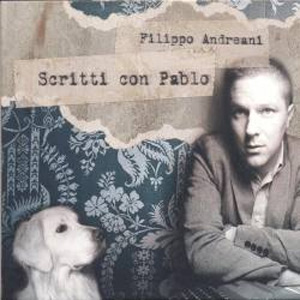
2011
Scritti con Pablo
versione trascritta dal video
Scritti con Pablo
Impossibile restare indifferenti di fronte a una canzone, sulle troppe morti accidentali dentro i commissariati, che parafrasando una frase di Savage Landor, comincia subito con questo formidabile paradosso. Narrando di Aldo Bianzino, entrato in ottima salute nel carcere di Capanne (PG) ed uscito morto tre giorni piu’ tardi, la canzone riguarda i vari Cucchi, e Aldrovandi, e quant’altri, anarchici o immigrati, siano morti in circostanze oscure, quando la passione di alcune guardie per la fisicità degenera in metastasi.
Brano importante, marcato, con la tromba lirica che ricama sul cantato e segna il refrain.
(bielle.org)
Brano importante, marcato, con la tromba lirica che ricama sul cantato e segna il refrain.
(bielle.org)
versione trascritta dal video
Le guardie sputerebbero in faccia
(continuer)
(continuer)
envoyé par DonQuijote82 15/10/2011 - 15:24
Flowers of freedom (a song for Kurdistan)
Pino Libonati
Flowers of Freedom is a project born with the contribution of various artists, like Claudia Cooper, Cyril McCammon and Pino Libonati. The aim was to realize a song honouring and supporting the Kurdish cause in the world, telling about all the vicissitudes this ancient and wonderful people had and have to suffer.
Toi c'est dans ta vie qui change
(continuer)
(continuer)
envoyé par DonQuijote82 15/10/2011 - 14:32
Parcours:
Du Kurdistan
Storia di Rodolfo Foscati [Storia del 107]
![Storia di Rodolfo Foscati [Storia del 107]](img/thumb/c5747_130x140.jpeg?1328384704)
Chanson italienne (Toscan Florentin) - Storia di Rodolfo Foscati [Storia del 107] – Caterina Bueno
La « Storia di Rodolfo Foscati » ( traduite en français sous le titre de « CENT-SEPT ») est ancienne et terrible chanson de prison de la tradition toscane.
Cette chanson a une origine obscure. Il y a un Rodolfo Foscati, patriote milanais, emprisonné durant les mouvements carbonari de 1821. Il y en a un autre de San Frediano, à Florence, protagoniste d'un événement sanglant et condamné à perpétuité. Peut-être ces deux figures se superposent, peut-être non ; la chanson est sûrement toscane et présente de manière crue les premiers et terribles jours de l'internement à vie...
Cette chanson est née à Florence dans le quartier de S. Frediano, est connue dans toute la Toscane comme « L'histoire du Cent-sept ». On dit qu'elle a été composée par le protagoniste lui-même : Rodolfo Foscati.
« Cent-sept »,... (continuer)
La « Storia di Rodolfo Foscati » ( traduite en français sous le titre de « CENT-SEPT ») est ancienne et terrible chanson de prison de la tradition toscane.
Cette chanson a une origine obscure. Il y a un Rodolfo Foscati, patriote milanais, emprisonné durant les mouvements carbonari de 1821. Il y en a un autre de San Frediano, à Florence, protagoniste d'un événement sanglant et condamné à perpétuité. Peut-être ces deux figures se superposent, peut-être non ; la chanson est sûrement toscane et présente de manière crue les premiers et terribles jours de l'internement à vie...
Cette chanson est née à Florence dans le quartier de S. Frediano, est connue dans toute la Toscane comme « L'histoire du Cent-sept ». On dit qu'elle a été composée par le protagoniste lui-même : Rodolfo Foscati.
« Cent-sept »,... (continuer)
CENT-SEPT
(continuer)
(continuer)
envoyé par Marco Valdo M.I. 15/10/2011 - 12:31
Capitalism Stole My Virginity

Album: A New Morning, Changing Weather (2001)
Dedicata a tutti quelli che domani, 15 ottobre 2011, scenderanno in piazza, non tanto a indignarsi contro una casta o contro i privilegi dei politici, quanto per far sentire la loro voce contro un sistema fallimentare e assassino.
Dedicata a tutti quelli che domani, 15 ottobre 2011, scenderanno in piazza, non tanto a indignarsi contro una casta o contro i privilegi dei politici, quanto per far sentire la loro voce contro un sistema fallimentare e assassino.
Nowhere is untouched by the shame
(continuer)
(continuer)
envoyé par CCG Staff 14/10/2011 - 23:13
Garibaldi Blues

ciao questo garibaldi lo sto studiando a scuola e mi sembra un tipo interessante :)
amanda bruno 14/10/2011 - 15:29
Fuck Religion
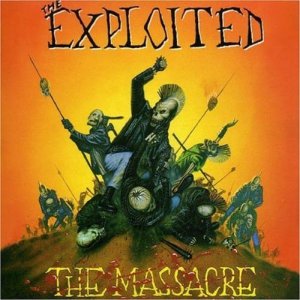
[1990]
Album: The Massacre
Album: The Massacre
People die over religion..
(continuer)
(continuer)
envoyé par giorgio 14/10/2011 - 08:35
Parcours:
Antiwar Anticléricale
Такого, как Путин!
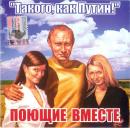
Guardate che questa non è una canzone satirica. E' seria.
Andrea 13/10/2011 - 18:03
Requiem
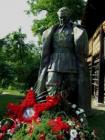
Bellissima e triste canzone. Complimenti anche per la traduzione.
Valentina 13/10/2011 - 14:38
Krivi smo mi
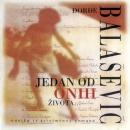
Balasevic è proprio un grande. Il testo di questa canzone è, purtroppo, bellissimo
Valentina 13/10/2011 - 12:23
Storia di Rodolfo Foscati [Storia del 107]
![Storia di Rodolfo Foscati [Storia del 107]](img/thumb/c5747_130x140.jpeg?1328384704)
Mi ricorda una canzone greca che dice "sono il numero otto, tutti mi conoscono cosi ed io guardo come un segreto qual' e il mio nome"...
il galeone 12/10/2011 - 21:53
Revolution

Emergency On Planet Earth - 1993
You've got to stand up, stay strong start movin' in the right direction
(continuer)
(continuer)
envoyé par DonQuijote82 12/10/2011 - 19:43
Daniele Silvestri: Questo paese

Testo e musica di Daniele Silvestri
da "S.C.O.T.C.H." (2011)
Feat. Stefano Bollani
Ciao a tutti, mi mancate ma si latita ormai da tempo a colpi di Paranza ;) Un abbraccio...
Marcia
da "S.C.O.T.C.H." (2011)
Feat. Stefano Bollani
Ciao a tutti, mi mancate ma si latita ormai da tempo a colpi di Paranza ;) Un abbraccio...
Marcia
La grandezza di questo paese
(continuer)
(continuer)
envoyé par Marcia 12/10/2011 - 11:37
Now I'm Dead

[1990]
Album: The Massacre
Album: The Massacre
Seen the ad on my TV set
(continuer)
(continuer)
envoyé par giorgio 12/10/2011 - 08:22
Il baricentro del Sud
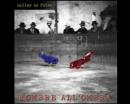
Version française - LE CENTRE DE GRAVITÉ DU SUD – Marco Valdo M.I. – 2011
Chanson italienne – Il baricentro del Sud – Hombre all'ombra
Écrite par Bartoloni Emiliano
Chanson italienne – Il baricentro del Sud – Hombre all'ombra
Écrite par Bartoloni Emiliano
LE CENTRE DE GRAVITÉ DU SUD
(continuer)
(continuer)
envoyé par Marco Valdo M.I. 11/10/2011 - 22:15
Inge, in natura et figura
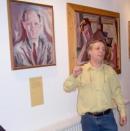
Inge, in natura et figura
Canzone française – Inge, in natura et figura – Marco Valdo M.I. – 2011
Histoires d'Allemagne 48
Au travers du kaléidoscope de Günter Grass. : « Mon Siècle » (Mein Jahrhundert, publié à Göttingen en 1999 –
l'édition française au Seuil à Paris en 1999 également) et de ses traducteurs français : Claude Porcell et Bernard Lortholary.
Mil neuf cent quarante-neuf, c'est l'année de la Foire du livre de Leipzig... Du moins pour notre Histoire d'Allemagne. Faut dire quand même que cette Foire du Livre a une histoire considérable, car c'est à Leipzig qu'on imprima le premier livre, c'est à Leipzig qu'on imprima le premier journal, à Leipzig que l'industrialisation du livre se développa en premier et toujours à Leipzig que fut créée la Bibliothèque nationale allemande... Faut dire aussi que le nom-même de la ville est dérivé du sorabe, langue parlée (encore à présent)... (continuer)
Canzone française – Inge, in natura et figura – Marco Valdo M.I. – 2011
Histoires d'Allemagne 48
Au travers du kaléidoscope de Günter Grass. : « Mon Siècle » (Mein Jahrhundert, publié à Göttingen en 1999 –
l'édition française au Seuil à Paris en 1999 également) et de ses traducteurs français : Claude Porcell et Bernard Lortholary.
Mil neuf cent quarante-neuf, c'est l'année de la Foire du livre de Leipzig... Du moins pour notre Histoire d'Allemagne. Faut dire quand même que cette Foire du Livre a une histoire considérable, car c'est à Leipzig qu'on imprima le premier livre, c'est à Leipzig qu'on imprima le premier journal, à Leipzig que l'industrialisation du livre se développa en premier et toujours à Leipzig que fut créée la Bibliothèque nationale allemande... Faut dire aussi que le nom-même de la ville est dérivé du sorabe, langue parlée (encore à présent)... (continuer)
Sur les plages du côté de Stettin,
(continuer)
(continuer)
envoyé par Marco Valdo M.I. 10/10/2011 - 16:33
La riva bianca, la riva nera

Io parlo in albanes
Eshte nje kenge fantastike e kenduar nga nje kengetare fantastike.
E kam degjuar ne Shqiperi qe ne vitin 1971 ne moshen 6 vjec dhe me ka mbetur ne mendje qe ne ate kohe.
(secondo google translate dovrebbe voler dire
"è una canzone fantastica cantata da una cantante fantastica.
L'ho ascoltata per la prima volta nel 1971 quando avevo sei anni in Albania e non l'ho mai dimenticata")
Eshte nje kenge fantastike e kenduar nga nje kengetare fantastike.
E kam degjuar ne Shqiperi qe ne vitin 1971 ne moshen 6 vjec dhe me ka mbetur ne mendje qe ne ate kohe.
(secondo google translate dovrebbe voler dire
"è una canzone fantastica cantata da una cantante fantastica.
L'ho ascoltata per la prima volta nel 1971 quando avevo sei anni in Albania e non l'ho mai dimenticata")
10/10/2011 - 14:03
מלחמה

Just browsing the Yiddish songs.
This one also caught my attention (see comment about "Shtil di Nakht") - also full of spelling mistakes in the original.
1) Even the title is wrong.
It says "מלכמה"
It should be "מלחמה"
2) in the 2nd verse, if one transliterates correctly:
Nito mayn kind, - a vaser
hot fartrunken alte miln.
This means:
There isn't any, my child, - a "water" (i.e. flood)
has flooded/swamped/inundated all the Mills.
and so, the Italian would be something like:
Non c’è, bambino mio, - acqua
ha inondato tutti i mulini.
3) in the 3rd verse, the water carried them down (aropgetrogn) - I assume the poet meant carried them away...
unless it's a typo and should be "opgetrogn" which is more logical - "carried them away" (as in "swept them away") - and retains the rhyme with "shlogn".
In either case, the Italian translation for that line is wrong. I'll leave it to... (continuer)
This one also caught my attention (see comment about "Shtil di Nakht") - also full of spelling mistakes in the original.
1) Even the title is wrong.
It says "מלכמה"
It should be "מלחמה"
2) in the 2nd verse, if one transliterates correctly:
Nito mayn kind, - a vaser
hot fartrunken alte miln.
This means:
There isn't any, my child, - a "water" (i.e. flood)
has flooded/swamped/inundated all the Mills.
and so, the Italian would be something like:
Non c’è, bambino mio, - acqua
ha inondato tutti i mulini.
3) in the 3rd verse, the water carried them down (aropgetrogn) - I assume the poet meant carried them away...
unless it's a typo and should be "opgetrogn" which is more logical - "carried them away" (as in "swept them away") - and retains the rhyme with "shlogn".
In either case, the Italian translation for that line is wrong. I'll leave it to... (continuer)
Leybl Botwinik 10/10/2011 - 12:09
Dodici ottobre
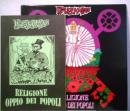
Chanson italienne – Dodici ottobre – Infezione – 1991
Texte (re)trouvé dans « Nel cuore della bestia », ouvrage fondamental de Stefano Giaccone et Marco Pandin sur le monde de l'autoproduction musicale en Italie des années 1980.
Le 12 octobre 1492, Christophe Colomb « découvrit » les Amériques ... Et les autochtones, lesquels ne savaient pas encore qu'ils étaient des « Indiens », criaient « Ciel ! Nous sommes découverts ! » et ils coururent se cacher dans la forêt, dit Lucien l'âne en riant de toutes ses blanches dents. D'ailleurs, Marco Valdo M.I., mon ami, tu devrais en faire une chanson...
Peut-être, un de ces jours... Car, en effet, il s'agit là d'un moment important de la Guerre de Cent Mille Ans que les riches font aux pauvres afin de les dominer, de les coloniser, de les exploiter, de les soumettre à leur vouloir – je n'ai pas dit leur « bon vouloir » - expression des rois de France... (continuer)
Texte (re)trouvé dans « Nel cuore della bestia », ouvrage fondamental de Stefano Giaccone et Marco Pandin sur le monde de l'autoproduction musicale en Italie des années 1980.
Le 12 octobre 1492, Christophe Colomb « découvrit » les Amériques ... Et les autochtones, lesquels ne savaient pas encore qu'ils étaient des « Indiens », criaient « Ciel ! Nous sommes découverts ! » et ils coururent se cacher dans la forêt, dit Lucien l'âne en riant de toutes ses blanches dents. D'ailleurs, Marco Valdo M.I., mon ami, tu devrais en faire une chanson...
Peut-être, un de ces jours... Car, en effet, il s'agit là d'un moment important de la Guerre de Cent Mille Ans que les riches font aux pauvres afin de les dominer, de les coloniser, de les exploiter, de les soumettre à leur vouloir – je n'ai pas dit leur « bon vouloir » - expression des rois de France... (continuer)
DOUZE OCTOBRE
(continuer)
(continuer)
envoyé par Marco Valdo M.I. 9/10/2011 - 17:41
Come finirà
anonyme
Ulteriori ricerche mi fanno precisare che si canta sull'aria delle sestine da cantastorie toscano, o aria della Giulia, conosciuta anche come aria del Batacchi.
Un paio di rettifiche: non proviene dalla Lucchesia ma dal Valdarno; non risale al 1849 ma a dopo l'Unità, quindi dopo il 1861.
Pardo Fornaciari
Un paio di rettifiche: non proviene dalla Lucchesia ma dal Valdarno; non risale al 1849 ma a dopo l'Unità, quindi dopo il 1861.
Pardo Fornaciari
pardofornaciari@libero.it 9/10/2011 - 10:47
Natale di seconda mano
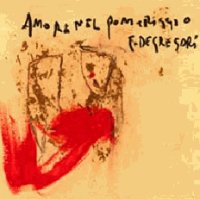
[2001]
Testo e Musica di Francesco De Gregori
Album: Amore nel pomeriggio
Natale di seconda mano Quello di chi arriva in Italia dalle carrette del mare. E' ancora la storia dal punto di vista di chi ci sta sotto nell'attraversamento di un mare prima di tutto metaforico. L'autocitazione del Sior Capitano, che qui è uno scafista, rimanda al Titanic. Il pianoforte, gli archi e l'arrangiamento sono di Nicola Piovani.
da Quello che non so, lo so cantare di Enrico Deregibus
Testo e Musica di Francesco De Gregori
Album: Amore nel pomeriggio
Natale di seconda mano Quello di chi arriva in Italia dalle carrette del mare. E' ancora la storia dal punto di vista di chi ci sta sotto nell'attraversamento di un mare prima di tutto metaforico. L'autocitazione del Sior Capitano, che qui è uno scafista, rimanda al Titanic. Il pianoforte, gli archi e l'arrangiamento sono di Nicola Piovani.
da Quello che non so, lo so cantare di Enrico Deregibus
Oggi è tempo d'incendi, organizziamo presepi
(continuer)
(continuer)
envoyé par Luca 'The River' 9/10/2011 - 02:13
Justicia, Tierra y Libertad

Justice, land and liberty
(continuer)
(continuer)
envoyé par DonQuijote82 8/10/2011 - 23:29
×
![]()


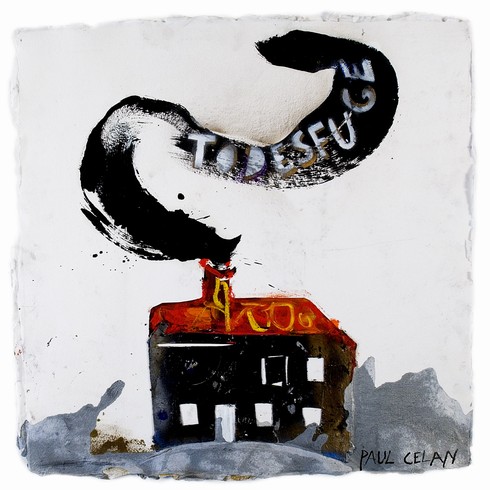
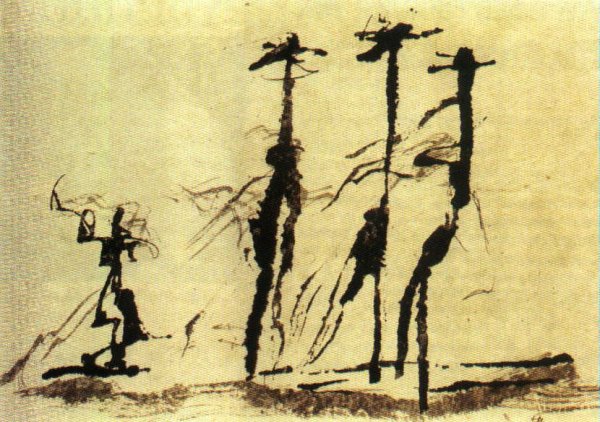
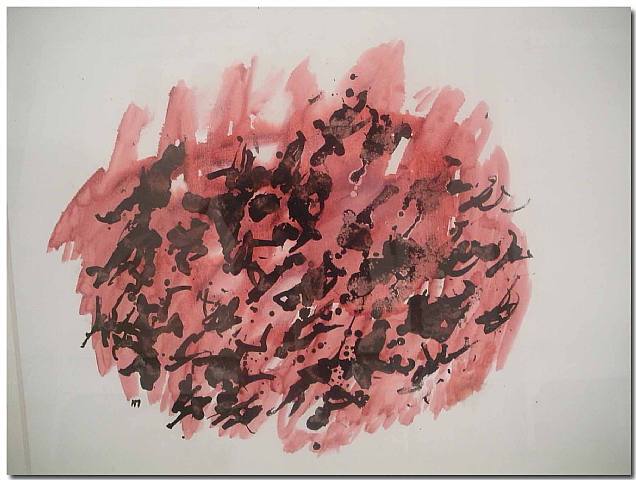
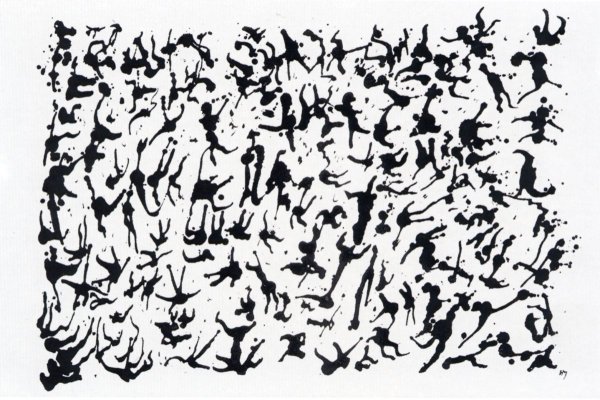

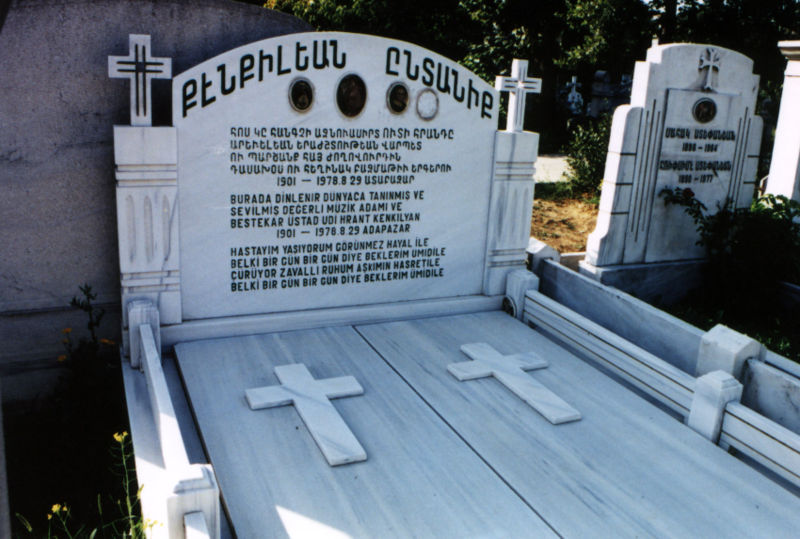
![The Dance [Պարը] - Ter Vogormia [Տէր Ողորմյա]](img/upl/siam.jpg)
![Su patriottu Sardu a sos feudatarios [Procurad' e moderare]](img/thumb/c5768_130x140.jpeg?1652257123)
![Su patriottu Sardu a sos feudatarios [Procurad' e moderare]](img/upl/tyndale.jpg)
![Su patriottu Sardu a sos feudatarios [Procurad' e moderare]](img/upl/iledesardaigne.jpg)
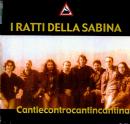




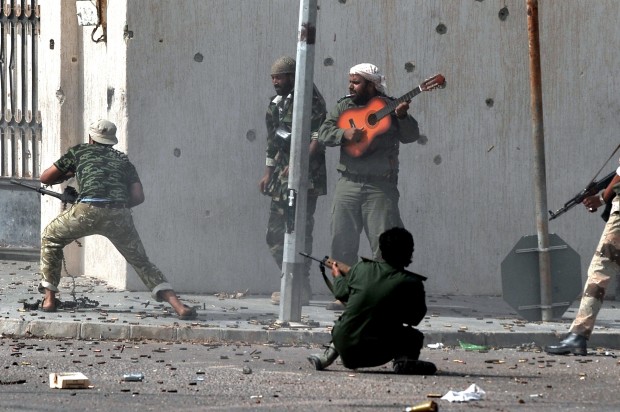



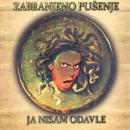


This song has been well-received by Occupiers and their supporters, so I thought I'd spend a day at Big Red Studio when I got home to Portland, and I did -- with a stellar cast of musicians: Jarrod Kaplan on percussion, Arcellus Sykes on bass guitar, with Billy Oskay producing and engineering and Jim Cuda assisting.
As with any of my songs, you're welcome to play it, use it in videos, sing it, etc. If you want to sing it, it's easy - 3 chords: D, A and G!
(David Rovics)